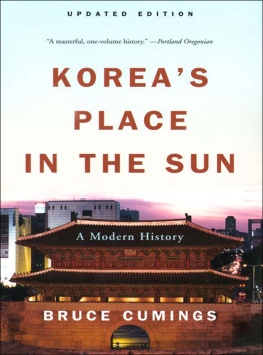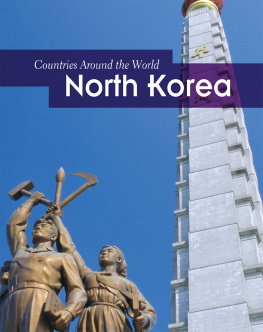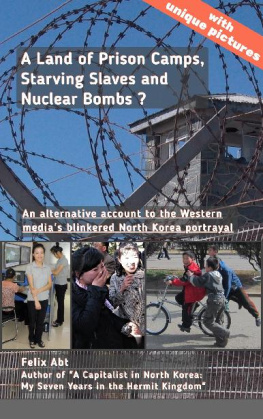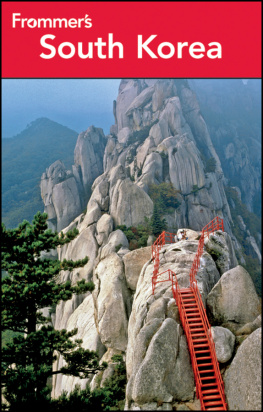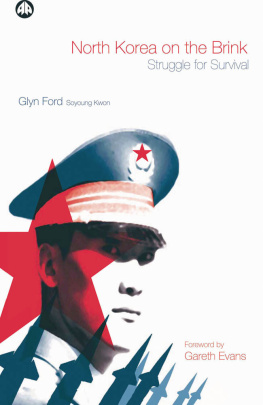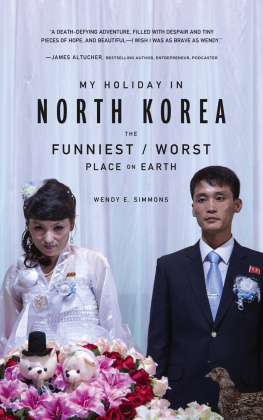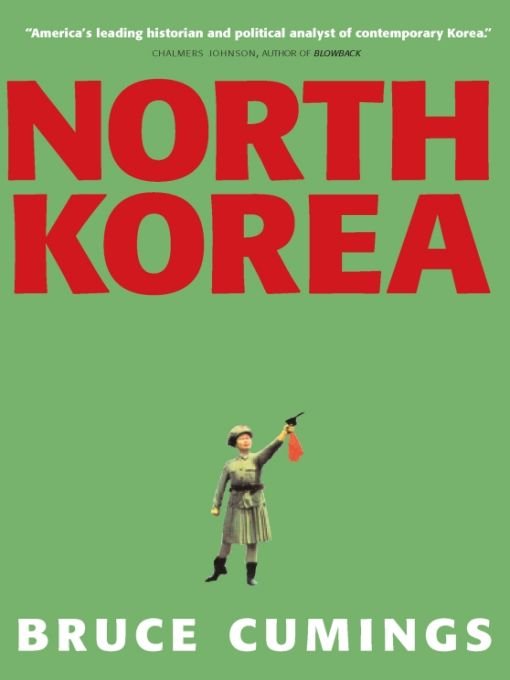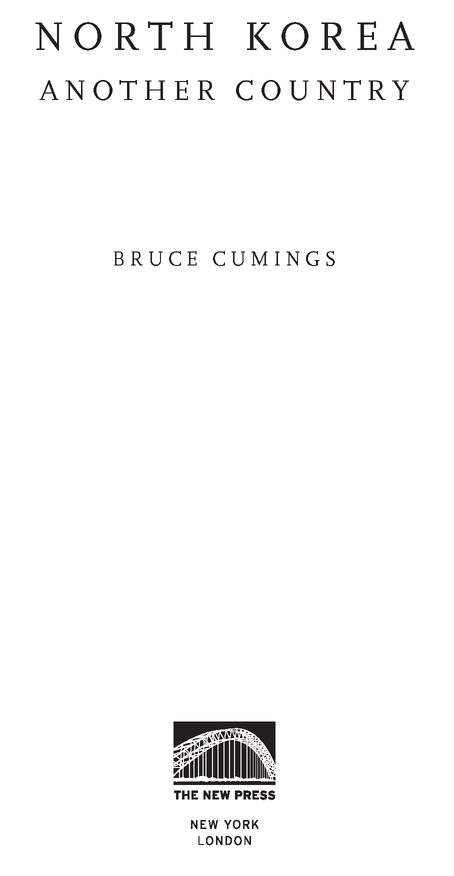Table of Contents
Vivaldo dreamed that he was running, running, running, through a country he had always known, but could not now remember, a rocky country.... He was both fleeing and seeking, and, in his dream, the time was running out. There was a high wall ahead of him, a high, stone wall... as he ran or as he was propelled, he was weighed down and made sick by the certainty that he had forgottenforgottenwhat? some secret, some duty, that would save him.... And now he knew that his enemy was upon him. Salt burned his eyes. He dared not turn; in terror he pressed himself against the rough, wet wall, as though a wall could melt or could be entered. He had forgottenwhat? how to escape or how to defeat his enemy.
James Baldwin, Another Country
PREFACE
JUDGING FROM OUR media, North Korea is the country every American loves to hatebeginning with President George W. Bush, who made it a charter member of his axis of evil and hoped to topple it. CNN never fails to introduce a story on the North using film clips of soldiers goose-stepping through Pyongyang. It is led by Kim Jong Il, diagnosed by the well-known expert Greta van Sustern to be insane or diabolical. The Central Intelligence Agency (CIA) says it possesses one or two nuclear weapons, along with chemical and biological weapons of mass destruction (WMD) and long-range missiles capable of delivering anything from atomic bombs to the smallpox virus along the American West Coast. What we dont know is even worse, or so we are told. A mimetic American commentary unites diverse opinion on one point: this place is a rogue-terrorist-communist-Stalinist-totalitarian-Oriental nightmare, Americas most loathed and feared Other. The real mark of our continuous crises with the North, however, is the deafening absence of any contrary argument; the one remaining self-proclaimed top-to-bottom alternative to neoliberalism and globalization is anathema to everyone, progressives as well. Americans wish Kim Jong Ils socialism-in-one-family would just go away, the sooner the better.
North Korea has been around for a long time, however, and contrary to media punditry, we know a lot about itand so does our government. An internal CIA study almost grudgingly acknowledged various achievements of this regime: compassionate care for children in general and war orphans in particular; radical change in the position of women; genuinely free housing, free health care, and preventive medicine; and infant mortality and life expectancy rates comparable to the most advanced countries until the recent famine. A number of other recent books, based on captured North Korean documents or secret materials from the former Soviet Union and China, make this a knowable country, as fascinating as it is repellent, as formidable as it is unique and idiosyncratic.
North Korea does not exist alone, in a vacuum, even if the regimes inveterate solipsism would make you think otherwise. It cannot be understood apart from a terrible fratricidal war that has never ended, the guerrilla struggle against Japanese imperialism in the 1930s, its initial emergence as a state in 1945, its fraught relationship with the South, its brittle and defensive reaction to the end of the Cold War and the collapse of the Soviet Union, and its interminable daily struggle with the United States of America. On September 8, 1945, U.S. combat troops first occupied Korea; three months later the commander of the Occupation, Gen. John Reed Hodge, declared war on the communist party (the one in the southern zone), and in the spring of 1946, he issued his first warning to Washington of an impending North Korean invasion. If our postwar occupation of Iraq follows Koreas pattern, the country will be divided (probably into three parts, not two), five years later a civil war will erupt and millions will die but nothing will be solved, and in the 2060s, nearly 40,000 American troops will still be there, holding the line against the evil enemy (whoever he might be), with a new war possible at any moment. We have been locked in a dangerous, unending, but ultimately futile and failed embrace with North Korea since Dean Rusk consulted a map around midnight on the day after we obliterated Nagasaki with an atomic bomb, and etched a border no one had ever noticed before at the 38th parallel.
In our time, more than a decade of dangerous cat-and-mouse diplomacy has now passed between the United States and North Korea, with Pyongyang playing the hole card of its nuclear program and its missiles, and successive American presidents stumbling about to react and respond. In the new century the North doesnt want the United States out of Korea, in spite of regime propaganda, but wants us to stay involved, to deal with a new and threatening strategic environment since the collapse of the Soviet Union (which abruptly abandoned the North in 1991), to help the country through its current difficult transition, and to keep the South from swallowing it. Sooner or later an American president will come to understand this, the crisis will end, embassies will be exchanged, and Americans will begin to enjoy touring this beautiful Hermit Kingdom and meeting its unknown but warm, proud, and dignified people.
In this slim volume I have tried to write for the reader who wishes to learn about our eternal Korean enemy. The experience of recent years, however, makes me wonder if Americans can ever transcend their own experience and join a world of profound difference. When all your truths are self-evident and when the fondest hope of foreigners from Azerbaijan to Zimbabwe is to become a citizen of your country, it is difficult to understand that not everyone in the world wants to be an American. Our history is one of launching out on missions to transform the worldin the contemporary case, to rid the world of evilfollowed by inevitably chastened returns to a continental homeland that is fundamentally sufficient unto itself. The commanding interpretation of this back-and-forth phenomenon is Louis Hartzs classic, The Liberal Tradition in America. At the end of the book he hopedit was only a hopethat Americans would find that spark of philosophy enabling them to live comfortably with a world very different from American imaginings.
My interest in North Korea succeeded my long involvement with South Korea, which I first got to know in the Peace Corps many moons ago. I have no sympathy for the North, which is the author of most of its own troubles, specializes in self-defeating behavior, treats like children the masses of its own population unlucky enough to be excluded from the elite, and indulges in such stereotypical hero worship, grandiose exaggeration, and wretched excess as to make even a scholar of East Asia reach for dusty old tomes with titles like Oriental Despotism. But on my infrequent visits to the country, I have been happyin trying to fathom an undeniable difference, in getting to know ordinary people who say and do the same things ordinary people do in the South, in meeting highly skilled officials who have taken the measure of our leaders more than once, and in not hearing my Calvinist conscience tell me its all my fault. It is their country, for better or worseanother country. I dont feel a responsibility for what goes on there, except perhaps the significant responsibility that all Americans share for the garrison state that emerged on the ashes of our truly terrible destruction of the North half a century ago (it is our fault?).


